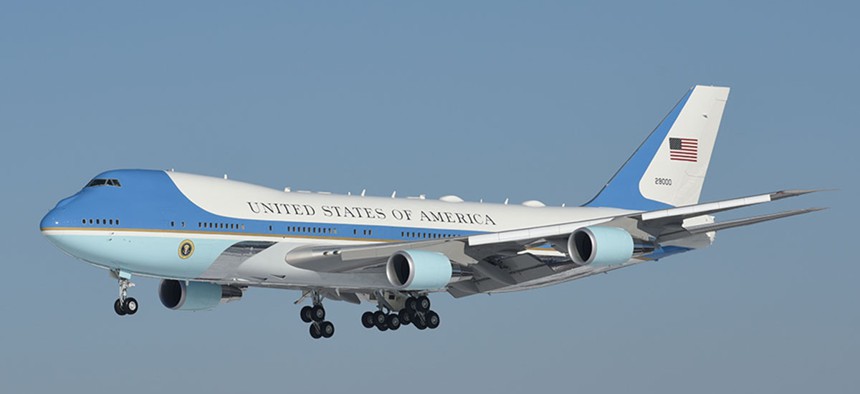
Senior Airman Kyle Brooks / Air Force
No-Bid Maintenance Contract Sweetens Air Force One Deal for Boeing
A newly released contracting document reveals details about the $3.9 billion deal to buy and modify two 747s for presidential use.
Boeing’s deal to turn two 747s into flying White Houses is actually somewhat sweeter than its initial $3.9 billion price tag. A newly released Air Force contract document shows that the Chicago-based aerospace giant will also receive a no-bid contract likely worth hundreds of millions of dollars to maintain the two jets for five years.
Produced in May and posted on July 20, the document says Boeing’s logistics contract will cover the procurement, repair, and overhaul of spare parts; engine maintenance and overhauls; support equipment; and training. It also says the Air Force contracting team convinced Boeing to turn over data “above and beyond what is normally provided to 747-8 purchasers.” That info could allow the Air Force to put logistics work for the planes out for bids after Boeing’s five-year deal runs out around 2029.
The document is a “justification and approval” form required for no-bid contracts; it’s fairly common for the Pentagon to award maintenance and logistics work to an aircraft’s manufacturer. For the current pair of Air Force One aircraft, the service paid Boeing more than $350 million between 2009 and 2017 for logistics support, according to GovTribe, a website that tracks federal contracts.
The document offers new details about the overall Air Force One deal, which took shape in a February meeting between Boeing CEO Dennis Muilenburg and President Trump, a longtime critic of the program. The two men reached an informal agreement to shave its cost — though the White House appears to have overstated the savings by nearly a billion dollars — and a formal agreement was announced last week. It will be a capped, firm-fixed price deal — meaning Boeing will have to eat the cost if the project goes over its $3.9 billion budget. (In February, neither the White House nor the Air Force would say what type of contract was agreed upon.)
The document also reveals details about the planes themselves. Boeing built the jetliners for a Russian airline that went bankrupt before they could be delivered; they were purchased last summer by the Air Force and have since been sitting in storage at an aircraft boneyard in the California desert.
Here are a few things the document reveals about the future Air Force Ones, which will be designated VC-25Bs:
- The 747s come with an eight-year warranty, which covers the commercial parts on the plane, not the military ones that will be installed in the coming years.
- The planes are expected to enter service in 2024.
- Boeing refused to provide the Air Force with “technical data necessary to allow any source other than Boeing to meet the USAF’s requirements.”
Among the items Boeing will install in the coming years:
- Two new doors on the left side of the plane — one in front and one behind the wing. Those doors will have fold-up stairs that all passengers to board and unload without using airstairs.
- Special military GPS will be installed in the 747-8 flight deck.
- The planes’ commercial transponders will be replaced with military transponders.
- Boeing will remove the plane’s single auxiliary power unit, replacing it with two new units that will generate power in flight.







